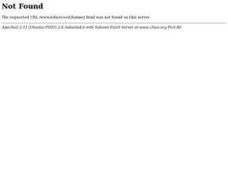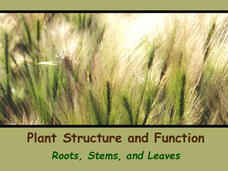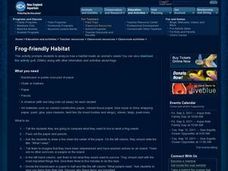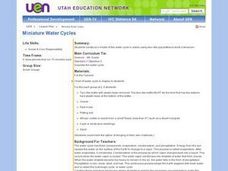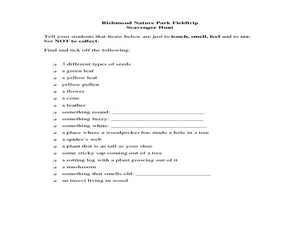Curated OER
Land Use Issues
Learners examine soil types and determine the ability of each to absorb water. Working in groups, they time how long it takes for water to seep out the bottom of the cups. They examine soil components, conservation, erosion, and tree...
Curated OER
Understanding How Potatoes Grow
Second graders make a KWL chart and brainstorm what they need for the project of growing potatoes. They choose one potato and plant it in water or peat moss cups and choose a location in which meets the needs of the plants and make their...
Curated OER
The Effects of Color on Heat Absorption And Climate
Students conduct an experiment to determine the effects of soil color on its day and night time temperatures. In small groups, they prepare dishes of black soil, brown peat moss, and white sand. They record the temperature changes when a...
Curated OER
Where The Blue Fern Grows
Students discuss ancient plants and their adaption in the world. Students review forms of plant propagation. Given proper supplies and directions, students apply a variety of fern spores to peat pellets, monitor the growth, and...
Curated OER
Recycling and Composting
Students set up composting sites that allow food scraps and paper to be recycled by nature. They are introduced to one aspect of recycling; composting. Students see how God recycles as the worms change garbage into something that brings...
Biology Junction
Plant Structure and Function: Roots, Stems, and Leaves
Scientists found fossils of plants more than 420 million years old—but plants existed for up to 100 million years prior to these fossils. Learn about the importance of plants to the entire planet. Viewing a presentation helps scholars...
Curated OER
Experimental Design Practice
In this experimental design worksheet, students are given two experimental scenarios to read. They answer questions about each including finding the hypothesis, the independent and dependent variables and controls. They design a graph...
Curated OER
Soil Soakers
Students work together to discover the relationship between water holding and drainage characteristics of soils. They record their observations and discuss the results. They examine particle size and pore sizes as well.
Curated OER
Archaeology: Digging in the Classroom
Students explore how an archaeologist works and makes discoveries. In this archaeology lesson, students participate in a simulation in which they excavate broken pottery. Students use measurement, geometry, and observation skills during...
Curated OER
Paleoclimates and Pollen
Students analyze soil for types of pollen to determine the probably climate conditions. In this earth science lesson, students make conclusions on what a climate is like based on soils samples. Students use a model soil...
Curated OER
Frog Friendly Habitat
Students create a frog friendly habitat. In this animal habitat lesson, students study what animals need to survive and then create a frog habitat from a shoe box. Students write a report about frogs and present their habitats to the class.
Curated OER
Grow Your Own Plant
In this plants worksheet, students follow directions on how to grow their own plant. Students read and follow 7 sets of directions for their plant.
Curated OER
Miniature Water Cycles
Students construct a model of the water cycle in action using two-liter pop bottles to build a terrarium. Locate examples of evaporation and condensation in the water cycle (e.g., water evaporates when heated and clouds or dew forms when...
Curated OER
Miniature Water Cycles
Fourth graders create a biome of their choosing in a terrarium. Terrariums are observed and results recorded daily for 2 weeks. They observe/record changes in the water within their terrarium and use the data to write sentences...
Curated OER
Lesson Design Archaeology- Digging in the Classroom 2
Students participate in an in-class archaeology dig. In this archaeology lesson plan, students use problem solving skills to construct a puzzle. Students are assigned roles, such as the sifter, measurer, etc.
Curated OER
Apple Science
Sixth graders experiment with different ways to test an apple for ripeness. In this apple harvesting lesson, 6th graders conduct three different experiments to test apples for ripeness and carry-out four additional activities involving...
Curated OER
Bog Science
Students study bogs. They tour, collect physical, chemical, and biological data and analyze a pristine bog community. Using the data, they draw a map and a cross section of the bog.
Curated OER
Let it Grow, Let it Grow, Let it Grow
Students investigate, through a hands-on activity, in which type of soil a bean seed grows best. They create a bar graph representing each plant's growth in different soils.
Curated OER
Working Worms
Students study earthworms and their role in creating healthy soil for healthy food. In this earthworms and soil lesson plan, students complete an jug experiment to learn about the role of earthworms and healthy soil. Students read and...
Curated OER
Richmond Nature Park Field Trip
Students identify different plants and their uses by attending a field trip. In this Canadian plant lesson, students explore the great outdoors of Vancouver, B.C. and discuss the uses of plants by the Native Americans that once resided...
Curated OER
Origin of Coal
Students explore how coal is formed. They then discuss the information and answer any questions that they may have on the formation of coal. Students then answer questions in reference to the coal discussion and reading.


